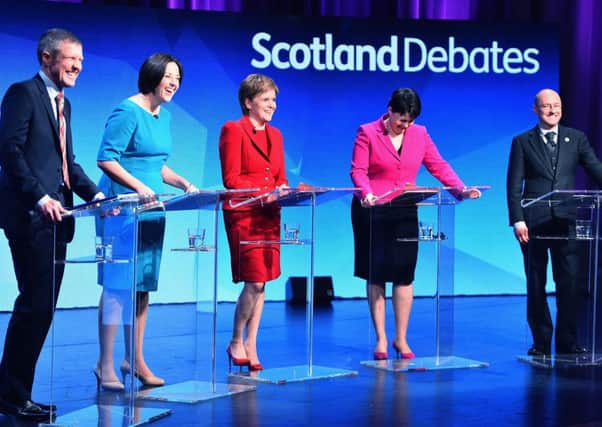Tom Peterkin: Tax and independence set tone for TV debates


Needless-to-say there is more spin being spun than a Shane Warne googly as party hacks shamelessly talk up the performance of their leaders.
Pundits,meanwhile, attempt to cut through this miasma of opinion, claim and counter-claim to work out which politicians have enhanced their reputations and which have not. Amid all this guff, one pundit remarked that the two televised debates broadcast so far in this election campaign had – if nothing else – “set the tone” for the next six long weeks. The road to May 2016 has already seen two large set-piece televised events – the first last week hosted by the BBC in the Glasgow Science Centre and STV’s two-hour marathon held this week in Edinburgh’s Assembly Rooms.
Advertisement
Hide AdAdvertisement
Hide AdOn both occasions, the new tax powers coming to Holyrood were a defining issue – setting the tone for the long campaign ahead.
On one side there are the progressive tax raisers in Labour’s Kezia Dugdale and the Lib Dems’ Willie Rennie, with their plans to put a penny on income tax to pay for public services.
On the other side, there is the Conservatives’ Ruth Davidson promising not to raise Scottish tax above that of the rest of the UK and to pass on George Osborne’s tax breaks for higher earners north of the Border. Caught in the middle is the SNP’s Nicola Sturgeon who has talked the progressive talk but, faced with the reality that she will be returned to office, has adopted a position based more on pragmatism than ideology.
Under assault from all sides, Sturgeon has a job on her hands to defend her position. But the harsh truth for her opponents is that her lead is so convincing that as long as she can get through these occasions without a major faux pas, there seems little chance of her band wagon being derailed. Nevertheless, it is noticeable that with a domestic record to defend, the SNP leader is not being given the free run she enjoyed when faced with Ed Miliband and co during the general election.
Dugdale has perhaps emerged as the surprise package, putting in a couple of decent performances – important if she is to see off the challenge of Ruth Davidson.
After a far from convincing performance in the BBC debate, Rennie was far more effective in the STV one, making some good points on mental health and attacking Sturgeon on tax.
But with the Lib Dems consigned to the margins, the outlook must appear pretty bleak for Rennie. Patrick Harvie, as ever, has proved good value and articulate – although the Greens’ tax plans and hostility to North Sea oil are too radical for most voters.
Davidson has suffered from her association with Osborne’s Budget and the attacks on his attempt to cut benefits for the disabled. She has also received stick for her plans to reintroduce prescription charges and to make graduates pay for their university education. However, it has been Davidson who won applause when challenging Sturgeon to rule out a second referendum – something the SNP leader will not do. This has also “set the tone” for the campaign. The pro-Union parties want to move Scottish politics away from independence on to new tax powers.
But like an overenthusiastic party spinner in the Spinroom, talk of indyref2 will not go away.